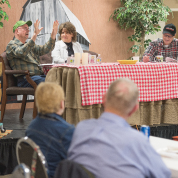Farm Dinner Theater
Posted on byIt is not new news that agriculture has excessive worker injury rates. Nor that senior farmers and adult farmers in the South experience some of the highest occupational injury and mortality in the nation. There were an estimated 58,385 work-related adult farm injuries (more than six every hour) in 2014. In 2016, 417 farmers and farm workers died from a work-related injury. Reaching farmers with safety and health information can be challenging. Farmers are seldom in the same place; they are used to working in isolation and taking care of their own safety; and they have little time to be away from the farm and their work. So how do we break though to this high-risk group with safety and health information? NIOSH grantee, Deborah Reed, PhD, a nurse at the University of Kentucky has a new idea that appears to be taking off. The farm dinner theater is a program funded by NIOSH through a research project grant. This project works with established community- based Cooperative Extension Agents in Kentucky, Tennessee, and Mississippi to develop and test a theater intervention aimed at positively changing farm work culture and safety behavior.

The theater uses a didactic reader format where participants read from scripts. Dr. Reed partners with County level cooperative Extension Services to develop scripts on topics relevant to their communities. Examples include falls, hearing conservation, skin cancer, intergenerational issues of work, equipment operation and reaction time, livestock handling, and virtually any topic related to the farming community. Local actors and farmers put on the plays. With advertising on local radio and in newspapers, the organizers try to create a buzz around the dinner theater event and want it to be a night out for farmers and their families.
It’s working. Each performance has a waiting list and the initial reviews are extremely positive. Phone surveys two weeks after the performance reveal that nearly 40 percent of theatergoers shared their new knowledge with non-attendees, and 60 percent made at least one change in their health or farm work behavior. Two weeks after the performance, the theater participants were significantly more likely to have thought about, talked about or done something to improve their health or work safety compared to the control group who received the same information via a mailed packet of material.
When talking about the dinner theater, participants said, “It was your story but it wasn’t. It (the theater) gave you permission to talk about things that you wouldn’t normally talk about. Messages were delivered in a non-threatening way which allowed you to get involved.” Another farmer commented, “We talked about what we had heard at the theater all the way home. We changed some things that night that we knew we should have already done but just hadn’t.” A county agent added, “We’ve never had such positive feedback from any other program we’ve ever done.”
This intervention has the potential to help decrease farmers’ injury rates not only in the Southern states where it is being tested but also throughout rural areas of the U.S. To help communities create their own theater, Dr. Reed is developing an online tool kit. For more information, contact Deborah Reed at dbreed01@email.uky.edu. If you participated in the dinner theater, we would like to hear from you. Please share your experiences in the comment section below.
The program and Deborah Reed were featured in a recent O Magazine article “Meet 5 Nurses Who Just Might Save the World”. The program has received numerous awards including the American Academy of Nursing’s Edge Runner Award and the Search for Excellence in Farm Health and Safety from the National County Extension Agriculture Agent Organization.
Julie Tisdale-Pardi, MA, is the NIOSH Science Blog Coordinator.
Deborah Reed, PhD, holds the Good Samaritan Endowed Chair in Community Health Nursing at the University of Kentucky College of Nursing. She is also Kentucky’s official agricultural health nurse in the UK College of Agriculture, Food and Environment.
NIOSH funds Dr. Reed’s work through an occupational safety and health research grant (R01).
This blog is part of a series highlighting extramural research funded by NIOSH through the Office of Extramural Programs.
Posted on by

